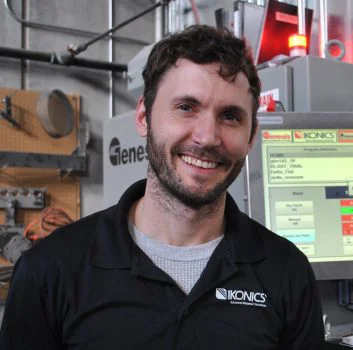Matt Gildner always has new challenges to look forward to at his job as a Senior Robotic Technician in IKONICS’s Advanced Material Solutions Division. “I handle everything from fixture design, robotics, programming, fabrication and set-up so each day is different,” he said. “People think robots are taking over all these jobs. Well, robots only do what someone tells them to do so there are always highly trained humans behind robot production.”
Gildner’s employer, IKONICS, is a Duluth-based imaging technology company that focuses on the creation and transfer of physical and visual images through processes based in photochemistry, abrasive etching, chemical etching and other technologies for international markets.
The division where Gildner works uses precision abrasive machining for composites, using aluminum oxide grit to produce complex holes or features in parts. Any shaped hole, slot or pattern is possible, and producing acoustic liners in jet engines is a typical application. Gildner’s recent project involved programming and operating a KUKA industrial robot to produce complex shaped parts for Bell Helicopter tail rotor vents. His division also works on perforation patterns on various materials for NASA and other aerospace giants.
“The stereotype of old school machining jobs in dirty, dark shops is slowly changing to people seeing that well-paying machining jobs now involve high tech computer programming and design,” said Gildner. “You see lots of openings for high tech machinists around the state and the country because of the baby boomers retiring.”
For someone interested in a machining career, he recommends LSC’s Integrated Manufacturing programs. “LSC’s shop floor is incredible. It’s probably the best in the region,” he said. “The class sizes are small and the instructors are with you on the floor, always helping and sharing their real world experience.”
Gildner has always liked working with his hands since he was a kid. His hobbies on the side include metal sculpture and foundry work with cast aluminum. “Not only is my work at IKONICS hands-on, it is also mentally demanding with math,” he said. “You don’t need to know differential equations but you do need some basic Cartesian math that you use for programming to tell a drill bit where to go to a point in space.” He recommends taking some trigonometry in high school to prepare for machining courses.
Gildner returned to school at LSC to earn a CNC Programmer AAS degree after working in family businesses in the Twin Cities and earning a BS in aerospace engineering from the University of Minnesota. “I was unfortunate to graduate in aerospace engineering during the 2008 recession so I have never worked in the field until now,” he said. His wife is from Duluth so they moved up from the Twin Cities and Gildner went back to school at LSC. “I plan to stay working in the industry. I am able to apply all my training and skills I honed at LSC– CNC programming, machining, welding and CAD design — on my job on a regular basis to design and create, problem-solve and produce high tech products. I love it here in Duluth.”



